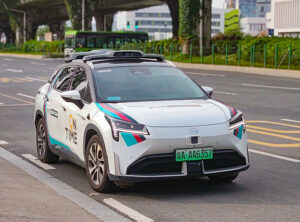Vehicle to grid (V2G) technology in the UK has come a step closer following a year-long project between Nissan and the University of Nottingham.
As a result of this work, Nissan has become the first car company to gain G99 Grid code certification with an AC-based solution, needed to supply electricity into the UK national energy supply.
The G99 Grid Code was introduced in 2019 to address the challenges of connecting renewable energy sources, such as wind and solar, to the grid. The code exists to ensure the stability of the electricity supply by establishing strict standards for how generators connect.
This led to an announcement by Nissan yesterday that they will be launching affordable on-board bi-directional charging on selected electric vehicles from 2026. By ‘affordable’ Nissan say that they are aiming to offer AC bi-directional charger at a price comparable to a mono-directional charger available today.
As well as lowering the cost of entry, Nissan’s V2G system will give customers complete control and flexibility over their energy via a dedicated App.
V2G – or Vehicle to Everything (V2X) – technology allows EV owners to use electricity stored in their car’s battery for purposes other than powering their car, such as powering their homes or selling it back into the grid.
Trials in Australia have demonstrated that in time of power outages, cars with V2G can be extremely useful. In their trial, 16 vehicles provided 107kW of support to the grid. This was the first time in the world such a vehicle-to-grid response to a grid emergency has been demonstrated.
Nissan – who have conducted over 40 pilot project around the world over the last decade, will launch V2G in the UK initially, followed by other markets in Europe.
The University of Nottingham has hosted Nissan on campus for the past year to allow them to run their testing and space to experiment. Staff with significant research experience in V2G have supported the project, and its integration within energy systems.
The University of Nottingham was also pivotal in the trial, providing a base of operations at its on-campus Creative Energy Homes, a 8-home micro-grid research test bed, and supporting academic research.
Under the banner of Nissan Energy, the company’s aim is to roll-out V2G technology across markets in Europe and beyond, empowering consumers with either AC or DC-based V2G solutions, in alignment with local infrastructure and regulatory requirements.
Professor Lucelia Rodrigues, Chair in Sustainable and Resilient Cities at the University of Nottingham said: ‘I’m delighted that our collaboration with Nissan has enabled such a significant breakthrough that will transform the future of electric mobility and contribute to more efficient and resilient energy systems.
‘This is a great step forward in the sector and will hopefully be the start of seeing such developments across other companies and countries as we move towards cleaner methods of energy and transport.’
Hugues Desmarchelier, Nissan Vice President, Global Electrification Ecosystem & EV Programs, said: ‘The technology we are bringing to customers is a potential game-changer for how we view the car. Not just as a means of getting from A to B, but as a mobile energy storage unit, capable of saving people money, supporting the transition of our energy systems away from fossil fuels and bringing us closer to a carbon-free future.’


















Leave a Reply